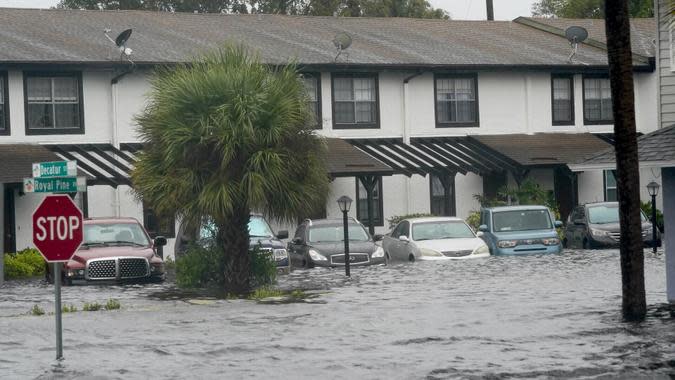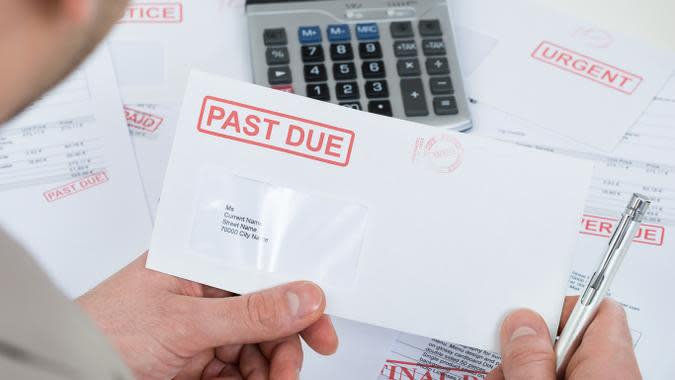

There’s only so much you can plan for in life, especially when it comes to money matters. You can budget with the best of them, but one bad day — or even a really good day — can upend all those grand plans. Frustrations aside, the question remains: What do you do when life tosses you a wicked curveball?
Read Next: Mark Cuban Reveals Why He Keeps a Strict Budget Everyday
For You: 4 Genius Things All Wealthy People Do With Their Money
GOBankingRates took a look at some common, and not-so-common, curveballs that can impact your money.

You Die
“There’s one great way to control where your money goes when you die: draft a will,” said Rebecca Neale, a family law attorney in Massachusetts.
If you don’t have a will, the laws of the state where you lived will dictate who gets your money. It might all go to your spouse, be divided among your spouse and kids or go to your parents or siblings if you’re not married.
“Every state has its own hierarchy,” Neale said.
With a will, you can specify who gets your assets. However, your money isn’t handed out to your heirs automatically. Assets are distributed during a legal process called probate. Again, the process will vary depending on the state where you live, Neale said.
Find Out: Nearly Half of Americans Struggle To Pay Their Utility Bills: 5 Ways To Save
Explore More: I’m a Frugal Shopper: 4 Items I Always Buy Secondhand To Save Money
Wealthy people know the best money secrets. Learn how to copy them.

You Need Family Care
Dealing with our own health problems can be challenging enough emotionally and financially, but seeing our parents, grandparents, and beloved elders need care can truly wreak havoc on our hearts and our wallets.
With over three decades in estate planning and elder law, Marty Burbank, owner of OC Elder Law has seen the impact first-hand. He said that the sudden illness or disability of a family member can be a major financial curveball through overwhelming medical bills and loss of income.
“The key to mitigating this risk involves having comprehensive health and disability insurance,” he said. “Additionally, it’s beneficial to set up an emergency fund to cover unforeseen medical expenses, which can help families navigate through tough times without financial strain.”
The financial impacts of the situation can be compounded if you need to find long-term care options for your family member. Burbank recommended considering long-term care insurance, which helps cover the cost of assisted living or nursing home care.
“Another proactive measure is Medi-Cal planning, which can legally position assets to qualify for benefits without exhausting the family’s resources,”” he said. “These steps can significantly ease the financial burden of long-term care.”
Trending: 10 Things Frugal People Always Buy at Yard Sales To Save Money

You’re Hit With a Natural Disaster
One moment, your home and business are flourishing. Then the skies darken. Or the ground rumbles. The wind gets wild. The next thing you know, the once vibrant business you’ve run for years is utterly wrecked. Your home is now a pile of scattered driftwood. Beyond the immediate emotional devastation, it’s going to take a lot of money to rebuild.
Natural disasters can impact anyone, and they’re a prime example of the curveballs that can shatter your finances. As the founder and CEO of Prestizia Capital Group Inc. and managing director of Presizia Insurance, John Crist is well aware of what devastation can do not only to building structures but to bank accounts.
“We worked with a business owner whose property was severely damaged by flooding. Not only did they face massive repair costs, but their operational downtime led to substantial revenue loss,” he said.
Crist shared that getting robust flood insurance and business interruption insurance can give you a financial buffer against natural disaster. He said that these policies can offer more than direct aid for the repairs but also cover lost income during the recovery – helping you bounce back much faster.

You Make More Money
Getting a significant raise or a new high-paying job may sound like the kind of curveball almost anyone would like to be hit with, but according to Bill Ryze, Chartered Financial Consultant (ChFC), even a windfall at work requires proper planning.
“[This kind of change] increases fund inflow, but it also requires you to make critical financial decisions. Doing the wrong things at the wrong time can land you in a financial mess,” he said.
In particular, Ryze advised against succumbing to the temptation to simply spend your extra income, and instead build a careful spending and saving plan.
“Consider increasing your retirement account contributions at work to match your new salary. You can also earmark more funds for your emergency savings accounts,” he said.

You Win the Lottery
Your chances of winning a big jackpot are slim. But if you do, you’ll obviously have a lot more money — and a big tax bill. Lottery winnings are taxed as income on the state and federal level, according to the Tax Foundation. Yet there’s another drawback to coming into that much money at once.
“You might have to reorganize your life,” said Carlos Dias Jr., founder and managing partner of Dias Wealth, LLC , an Orlando, Fla., financial planning firm.
For example, you might need to set up a trust or corporation to receive the money to protect your identity, he said. And you might have to change your phone number to avoid being harassed by people who want a piece of your winnings.

You File for Bankruptcy
What happens to your money, assets and debt owed depends on the type of bankruptcy you file. Chapter 7 bankruptcy doesn’t erase all kinds of debt. You still have to pay student loans, tax debts and child support. Provided you don’t have those types of debt, most or all of your debts could be canceled. However, some of your property might have to be sold to repay your creditors, according to Nolo.
With Chapter 13 bankruptcy, you pay back your debts with a court-approved repayment plan. You don’t have to sell your property, and you might have to pay back some of your debts only partially — depending on what you can afford, according to Nolo.
Be Aware: 6 Things Frugal Boomers Never Buy
You Buy Stock in a Company That Goes Bankrupt
What happens to your investment in a company when the company goes bankrupt? “If you are a common stockholder, you are probably out of luck,” said Charles Read, CEO of online payroll service GetPayroll.
The company’s secured creditors are paid first. Then bondholders get paid.
“If there is anything left, which there is normally not, you may get a few cents on the dollar,” Read said. That’s why it’s important to diversify your portfolio rather than put all of your money into shares of a single company.

You Get Divorced
When you get divorced, your money will be divided between you and your spouse, Neale said. Exactly how it’s divvied up depends on state law. And your state might limit how you use your money as you go through the divorce process, she said.
It can also be costly to divorce your spouse. You’ll have to pay fees if you hire an attorney and go to court or use a mediation process to avoid court.

You Owe Child Support
“If you owe child support and are not paying it, the person you’re supposed to pay it to can file for contempt,” Neale said. Then the court can order you to make payments that you missed and pay going forward.
You might also be ordered to pay the attorney fees for the child support recipient, depending on state laws. In some circumstances, the child support recipient can ask that you be put in jail, Neale said.

You Don’t Pay Your Debts
If you don’t pay what you owe, your creditors can sue you. If you’re found liable, you’ll be forced to pay.
“They can seize your bank account,” Neale said. Your creditors might not be able to take every cent you have because every state has rules about how much you can keep safe from creditors in a bank account, Neale said.
Creditors also can garnish your wages to get what is owed, she said. Federal law limits garnishment to 25 percent of your disposable income or the amount your weekly income exceeds 30 times the minimum wage, whichever is lower, according to Nolo. Some states set a lower percentage.
Check Out: I’m a Self-Made Millionaire, but I Still Opt For the Budget Versions of These 6 Items

You Lose a Major Revenue Stream
Vincent Cerniglia, principal and VP at Noreast Capital Corporation learned first-hand what it’s like to be smacked with the financial curveball of losing a revenue stream when he watched a client lose 40% of their revenue after a long-term contract ended unexpectedly.
“To mitigate such risks, I advise diversifying your client base and income sources,” he advised. “Long-term, it’s crucial to develop a strategic plan that includes maintaining multiple revenue streams and regularly reassessing client contracts for stability.”

You Don’t Pay Your Student Loans
If you don’t pay a federal student loan, your tax refund can be seized, Neale said. And your wages can be garnished without a court order. So if you’re having trouble paying bills, make your student loan payments a priority, Neale said. Even if you file for bankruptcy, your student loans probably won’t be discharged.
If you don’t pay a private student loan, the lender can sue you in court to collect what is owed, Neale said.

You Loan Money to Family
It can be a bad idea to loan money to family, because you might not get it back. Then your relationship with that family member could be damaged. However, there are other financial repercussions, according to Amy Jucoski, head of Legacy & Wealth Planning and Foundng Partner of Callan Family Office.
“In instances when you loan larger amounts of money, it’s important to charge interest and to sign a loan contract,” Jucoski said. “If you don’t, the IRS could deem loan amounts that exceed $14,000 a year a gift. You probably won’t owe the gift tax — which is 40 percent — if you don’t exceed the $5.49 million lifetime gift exemption amount.” However, the amount of the gift will go against your lifetime gift exemption.
Plus, if you have a signed loan contract and the loan isn’t repaid, you can claim a tax deduction for a non-business bad debt, Jucoski said. “Be sure to work with your legal advisor when drafting a loan contract to ensure you’re covered,” she said.
Good To Know: 6 Valuable Everyday Items You Should Never Throw Away

You Have Forgotten Accounts
There might be money that belongs to you that you haven’t claimed. Perhaps you have a forgotten utility security deposit, an annuity or certificate of deposit you never collected or an insurance benefit you never received.
Accounts that haven’t had activity or the company hasn’t been able to contact the owner in a year or more are turned over to state treasurers, according to the National Association of Unclaimed Property Administrators. You can search for unclaimed property at MissingMoney, a website endorsed by NAUPA.

You Enter Witness Protection
It’s a secret as to what happens to your money if you enter the Witness Security Program. The program was created to protect witnesses who are in danger as a result of the testimony against criminals. Those who enter the program have to give up their identities.
The U.S. Marshals Service, which operates the program, provides only basic information on its website about what happens to the money of witnesses: “Witnesses initially receive financial assistance for housing, subsistence for basic living expenses and medical care. Job training and employment assistance may also be provided.”
Laura Bogart contributed to the reporting for this article.
More From GOBankingRates
This article originally appeared on GOBankingRates.com: The Financial Impact of 15 Life Curveballs: What Happens to Your Money?
Read More


